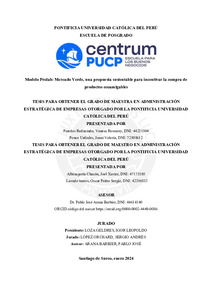| dc.contributor.advisor | Arana Barbier, Pablo José | |
| dc.contributor.author | Paredes Reducindo, Vanesa Rosmery | |
| dc.contributor.author | Ponce Urdiales, Joani Valeria | |
| dc.contributor.author | Albinagorta Chacón, Joel Xavier | |
| dc.contributor.author | Lavado Tueros, Oscar Pedro Sergio | |
| dc.date.accessioned | 2024-04-22T19:37:23Z | |
| dc.date.available | 2024-04-22T19:37:23Z | |
| dc.date.created | 2024 | |
| dc.date.issued | 2024-04-22 | |
| dc.identifier.uri | http://hdl.handle.net/20.500.12404/27652 | |
| dc.description.abstract | Las personas impactan en el medio ambiente con su estilo de vida generando residuos o
desperdicios. No obstante, en la actualidad estos no logran ser procesados adecuadamente debido
a una ineficiente gestión de los residuos sólidos. Por lo tanto, el presente trabajo presenta una
solución innovadora cuya finalidad es contribuir a la reducción de la acumulación de los residuos
sólidos, el cual es un problema social relevante que se ha incrementado a lo largo de los años y
que afecta negativamente al medio ambiente, a todas las personas y sus generaciones futuras.
En primer lugar, se aborda la situación crítica del problema analizada con enfoque global
por el Banco Mundial y otras instituciones. Además, se analizó la situación competitiva del
mercado elegido. A continuación, se detalla el crecimiento sostenido del comercio electrónico y
del mercado retail de productos ecoamigables identificando los actores que intervienen de acuerdo
a las cinco fuerzas de Porter.
Para ello, se analizaron las necesidades de los dos usuarios principales a través de
herramientas como el Journey Experience y Mapa de Empatía. Luego se procedió a diseñar una
propuesta de valor de acuerdo con la retroalimentación recibida de ambos usuarios sobre el
prototipo. Posteriormente, se elaboró el servicio en base al Flourishing Business Model Canvas.
Así mismo, para validar la deseabilidad del servicio se realizaron encuestas a los adquirentes y
entrevistas a los ofertantes, las cuales resultaron positivas validando la deseabilidad del servicio.
Finalmente, se completó el análisis financiero, mostrando la viabilidad del proyecto con la
obtención de un Valor Actual Neto (VAN) Financiero de US$1,250,039, partiendo de una
inversión inicial de US$202,361. Respecto al aspecto social, el proyecto ha impactado
directamente en dos objetivos de desarrollo sostenible (ODS), específicamente en los ODS 12 y
13, que han sido beneficiados con Índices de Relevancia social de 0.46 y 0.4, respectivamente.
Este impacto social se traduce en un Valor Actual Neto Social (VAN Social) de US$1,442,720. | es_ES |
| dc.description.abstract | People impact the environment generating waste with their lifestyle. However, this waste
is not processed properly due to inefficient solid waste management. This work presents a
business model aiming to contribute to the reduction of the accumulation of solid waste, which is
a relevant social problem that increasingly affects the environment, people and future
generations.
First, the critical situation of the problem is analyzed with the global approach provided by
the World Bank and different recycling industry organizations. In addition, the competitive
situation in the chosen market was analyzed. Then, the sustained growth of electronic commerce
and the retail market for eco-friendly products is detailed, identifying the actors involved according
to Porter's five forces.
The needs of the two main users were analyzed with Journey Experience and Empathy
Map methods. Then, a value proposition was designed according to the feedback received from
users about the prototype. Subsequently, the service was developed based on the Flourishing
Business Model Canvas. Likewise, to validate the desirability of the service, surveys were
conducted with the clients, as well as interviews with sellers, which validated the desirability of
the service.
Finally, the financial analysis was completed, showing the viability of the project by
obtaining a Net Present Value (NPV) of US$1,250,039 after five years, based on an initial
investment of US$202,361. Regarding the social aspect, the project has directly impacted two
Sustainable Development Goals (SDGs), specifically SDGs 12 and 13, which have benefited from
Social Relevance Indices of 0.46 and 0.4, respectively. This social impact translates into a Social
Net Present Value (Social NPV) of US$1,442,720. | es_ES |
| dc.language.iso | spa | es_ES |
| dc.publisher | Pontificia Universidad Católica del Perú | es_ES |
| dc.rights | info:eu-repo/semantics/closedAccess | es_ES |
| dc.rights.uri | http://creativecommons.org/licenses/by-nc-nd/2.5/pe/ | * |
| dc.subject | Productos ecológicos--Industria y comercio | es_ES |
| dc.subject | Mercado retail | es_ES |
| dc.subject | Desarrollo sostenible--Empresas--Perú | es_ES |
| dc.title | Modelo prolab: Mercado Verde, una propuesta sustentable para incentivar la compra de productos ecoamigables | es_ES |
| dc.type | info:eu-repo/semantics/masterThesis | es_ES |
| thesis.degree.name | Maestro en Administración Estratégica de Empresas | es_ES |
| thesis.degree.level | Maestría | es_ES |
| thesis.degree.grantor | Pontificia Universidad Católica del Perú. CENTRUM | es_ES |
| thesis.degree.discipline | Administración Estratégica de Empresas | es_ES |
| renati.advisor.dni | 44614140 | |
| renati.advisor.orcid | https://orcid.org/0000-0002-4449-0086 | es_ES |
| renati.author.dni | 44231504 | |
| renati.author.dni | 72508612 | |
| renati.author.dni | 47173195 | |
| renati.author.dni | 42356813 | |
| renati.discipline | 413307 | es_ES |
| renati.juror | Loza Geldres, Igor Leopoldo | es_ES |
| renati.juror | López Orchard, Sergio Andrés | es_ES |
| renati.juror | Arana Barbier, Pablo José | es_ES |
| renati.level | https://purl.org/pe-repo/renati/level#maestro | es_ES |
| renati.type | https://purl.org/pe-repo/renati/type#tesis | es_ES |
| dc.publisher.country | PE | es_ES |
| dc.subject.ocde | https://purl.org/pe-repo/ocde/ford#5.02.04 | es_ES |







